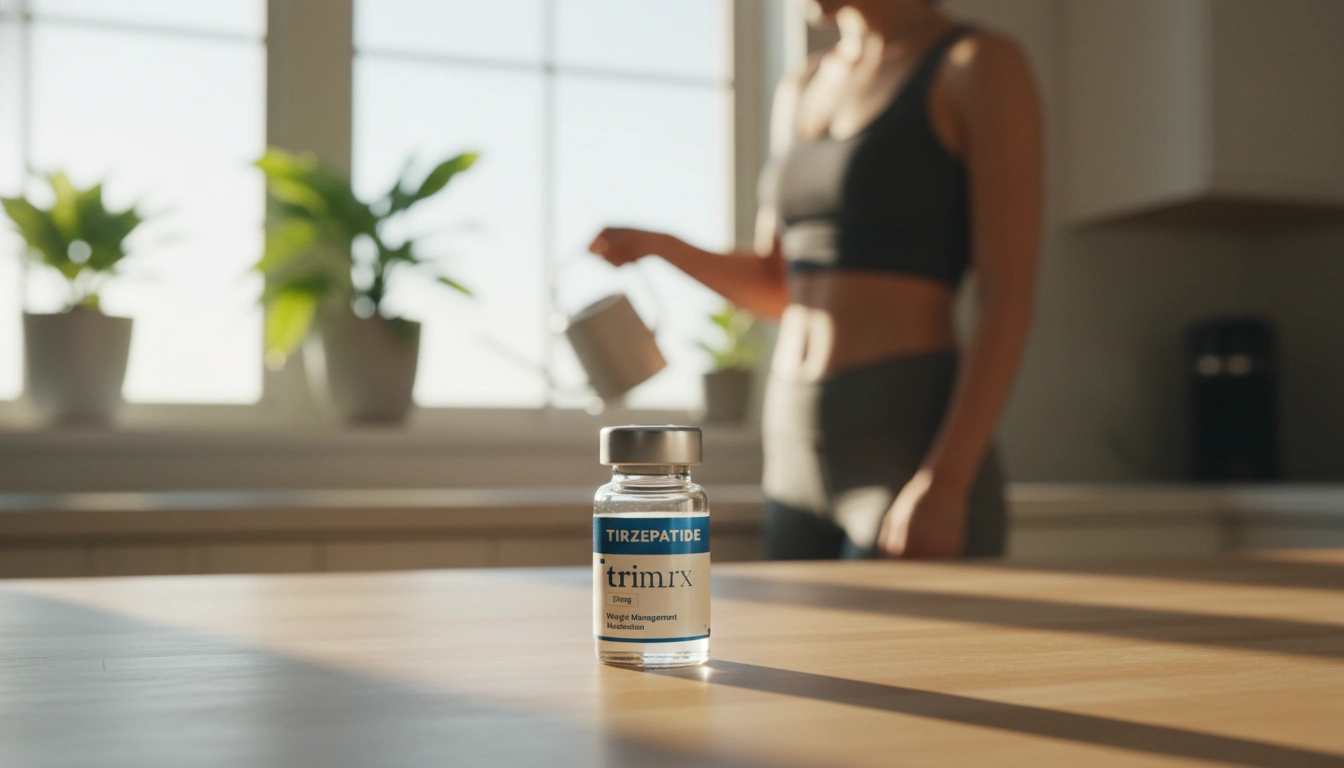Does Tirzepatide Make You Sleepy? Understanding Fatigue and Energy Changes with Tirzepatide

Introduction
Have you noticed a dip in your energy levels since starting tirzepatide? Or perhaps you've heard from others that this medication might leave you feeling sleepy or unusually tired? Fatigue is a common concern among those using weight loss and diabetes treatments, and tirzepatide, known by brand names such as Mounjaro® and Zepbound®, is no exception. But what lies behind these feelings of tiredness? Is it a direct effect of the medication, or a side effect of dietary changes it prompts?
Tirzepatide has been rapidly gaining attention for its powerful role in weight management and blood sugar control, revolutionizing treatment options for many. Yet, the nuanced experiences users report—especially around energy levels—deserve deeper exploration. Understanding whether tirzepatide can induce sleepiness or fatigue is essential for anyone considering or currently using this treatment.
In this blog, we'll navigate the science and user experiences surrounding tirzepatide's effects on energy and sleepiness. Together, we’ll explore why some people feel tired, the underlying mechanisms, and practical ways to manage this common side effect. Whether you’re curious about tirzepatide as part of a weight loss journey or diabetes management, we aim to provide clarity and actionable insights.
By the end of this post, you’ll better understand the relationship between tirzepatide and fatigue, how it might affect your day-to-day life, and what steps you can take to feel your best. If you are exploring treatment options, we also invite you to take our free assessment quiz to see if you qualify for personalized tirzepatide-based weight loss programs. Plus, discover quick-access supplements that can support your wellness along the way.
Let’s dive in.
What is Tirzepatide?
Before dissecting the question “does tirzepatide make you sleepy,” it’s helpful to understand what tirzepatide is and how it works. Tirzepatide is a medication that acts as a dual agonist for two incretin hormones: glucagon-like peptide-1 (GLP-1) and glucose-dependent insulinotropic polypeptide (GIP). These hormones play critical roles in regulating insulin secretion, appetite, and digestion.
Primarily approved for managing type 2 diabetes, tirzepatide also supports significant weight loss by reducing appetite and slowing gastric emptying — the process by which food leaves the stomach. This dual action helps individuals consume fewer calories, potentially leading to substantial weight reduction over time.
Brand names like Mounjaro® and Zepbound® represent FDA-approved formulations of tirzepatide, while compounded and oral versions are also available through personalized medical programs.
At TrimRx, our personalized weight loss solutions include tailored tirzepatide treatment plans combined with expert medical consultation, lab work, and ongoing support, all delivered via a user-friendly telehealth platform. We encourage anyone interested to take our free assessment quiz to find out if tirzepatide-based medication could be suitable for their health needs.
Exploring Fatigue and Sleepiness: Does Tirzepatide Cause These?
Common User Experiences with Fatigue
Fatigue, or a persistent feeling of tiredness and low energy, is reported by some individuals starting tirzepatide. Interestingly, fatigue does not always mean sleepiness in the traditional sense—it may manifest as a lack of energy, reduced motivation for physical activity, or an overall sense of sluggishness.
Many users describe the fatigue as temporary, most noticeable during the first few weeks or after dosage increases. It often improves as the body adapts to the medication.
Mechanisms Behind Tirzepatide-Related Fatigue
There’s no definitive scientific consensus yet on why tirzepatide may cause fatigue, but two prominent theories emerge from current research and clinical observations:
- Reduced Caloric Intake and Metabolic Adaptation
Tirzepatide suppresses appetite significantly, leading some users to eat less than their body needs for optimal energy. When calorie intake plummets, the body naturally slows down metabolism to conserve energy reserves. This metabolic slowdown can trigger feelings of tiredness or low energy because the body is prioritizing essential functions over activity and wakefulness.
- Influence on the Brain’s Sleep/Wake Regulation
Tirzepatide’s effects on hormones are mediated, in part, through the hypothalamus—a region of the brain that regulates hunger and the circadian rhythm (our internal clock dictating sleep and wake cycles). There’s preliminary evidence from animal studies that GLP-1 receptor agonists may affect sleep patterns, potentially altering normal wakefulness and sleep architecture. While this hasn’t been conclusively studied in humans, it provides a plausible explanation for tirzepatide’s influence on feelings of sleepiness or fatigue.
Fatigue Is Not the Same as Drowsiness
It’s important to distinguish between fatigue as general low energy and drowsiness, which is a direct urge to sleep. Most tirzepatide users report fatigue without increased sleepiness or difficulty staying awake. So, if you find yourself wide awake but feel lacking in stamina or vigor, it’s more likely the metabolic effects than sedation.
Other Common Side Effects That May Influence Energy
When considering whether tirzepatide makes you sleepy or fatigued, it’s useful to look at other commonly reported side effects that might contribute indirectly:
- Nausea and Vomiting: These gastrointestinal symptoms can drain energy, making you feel exhausted.
- Diarrhea or Constipation: Digestive irregularities can disrupt comfort and nutrient absorption, impacting vitality.
- Low Blood Sugar (Hypoglycemia): While rare when tirzepatide is used alone, low blood sugar episodes can cause shakiness, weakness, and fatigue.
- Injection Site Reactions: Local discomfort could add to overall tiredness in some users.
- Changes in Sleep Quality: Some users report disturbed sleep, which can exacerbate daytime fatigue.
Each of these side effects typically improves with time as your body adjusts or with the guidance of your healthcare provider.
How to Manage Fatigue and Maintain Energy on Tirzepatide
Feeling tired shouldn’t derail your progress. Here are practical strategies that can help you manage fatigue while benefiting from tirzepatide’s powerful effects:
1. Monitor Your Calorie and Nutrient Intake
Since appetite suppression is a key effect of tirzepatide, it can be easy to unintentionally consume too few calories or insufficient nutrients. Eating small, balanced, frequent meals rich in protein, healthy fats, and complex carbohydrates can sustain energy levels.
At TrimRx, we stress the importance of personalized nutritional support alongside medication. For added wellness, consider supplementing with our GLP-1 Daily Support or Weight Loss Boost products, available without a prescription, to nourish your body during your weight loss journey.
- GLP-1 Daily Support: Explore here
- Weight Loss Boost: Explore here
2. Establish Consistent Sleep Habits
Set a regular bedtime and wake time to support your circadian rhythm. Wind down with relaxing activities before sleep and limit screen time. Quality sleep helps combat fatigue and supports weight loss.
3. Stay Hydrated
Dehydration, especially if diarrhea or vomiting occur, can worsen fatigue. Drink plenty of water throughout the day to remain hydrated and help your system adjust to the medication.
4. Gradually Increase Physical Activity
While you may feel fatigued initially, moderate exercise such as walking or gentle yoga can boost energy and mood. Be mindful to pace yourself and listen to your body’s signals.
5. Communicate Regularly with Your Healthcare Provider
If fatigue persists or worsens, it’s vital to consult your medical team. They may adjust your tirzepatide dose or provide additional support.
At TrimRx, our personalized weight loss programs include unlimited support and consultations to help you navigate side effects safely and effectively. To find out if you qualify for a tirzepatide program tailored to your unique needs, take our free assessment quiz anytime:
Broader Benefits of Tirzepatide Despite Fatigue
While fatigue can be frustrating, it’s essential to keep sight of the significant benefits tirzepatide offers:
- Effective Blood Sugar Control: Especially for type 2 diabetes management.
- Sustained Weight Loss: Studies show notable BMI reductions with tirzepatide treatment.
- Appetite Regulation: Helping reduce overeating and support healthier lifestyle changes.
When paired with balanced nutrition and activity, tirzepatide can be a transformative tool on your health journey.
Summary: Does Tirzepatide Make You Sleepy?
- Fatigue is a reported side effect but varies among individuals.
- Fatigue from tirzepatide is usually temporary and linked mostly to reduced calorie intake or metabolic adjustments.
- True sleepiness or drowsiness directly caused by tirzepatide is uncommon.
- Supporting your body with proper nutrition, hydration, and sleep hygiene can alleviate tiredness.
- Ongoing communication with healthcare providers ensures personalized management of any side effects.
If you’re considering tirzepatide for weight management or diabetes control, taking a personalized health quiz can help determine your eligibility and provide a tailored care plan. At TrimRx, we combine clinically proven medications like tirzepatide with compassionate, medically supervised care focused on individualized success.
FAQs
Does tirzepatide actually make you feel sleepy?
Yes, tirzepatide can make you feel sleepy initially due to metabolic adjustments and calorie changes. TrimRx helps patients understand how fatigue develops and explains that sleepiness often occurs early while the body adapts to new energy patterns during treatment.
Why does tirzepatide cause sleepiness and fatigue?
Tirzepatide may cause fatigue due to lower calorie intake, blood sugar regulation, and metabolic shifts. TrimRx teaches patients to understand how these changes can temporarily reduce energy levels before the body stabilizes and vitality improves.
How long will tirzepatide make me feel sleepy?
Most patients experience sleepiness for 3–6 weeks as the body adjusts to tirzepatide. TrimRx explains that fatigue generally resolves once metabolism and energy balance normalize, leading to gradual improvement in alertness.
Can I do anything to prevent tirzepatide from making me sleepy?
Yes, eating enough protein, staying hydrated, and getting adequate rest can help reduce fatigue. TrimRx recommends these supportive habits to maintain energy and minimize the sleepy effects of tirzepatide during early treatment phases.
Does tirzepatide make everyone experience sleepiness and fatigue?
No, not everyone feels sleepy on tirzepatide. TrimRx observes that individual responses vary—some patients experience noticeable fatigue, while others feel minimal tiredness or even improved energy as treatment progresses.
Will the sleepiness from tirzepatide affect my daily life?
Tirzepatide may temporarily affect focus or activity levels early in treatment. TrimRx notes that these effects are short-lived, with most patients regaining normal energy as their metabolism adjusts and treatment stabilizes.
Does the dose affect how much tirzepatide makes you sleepy?
Yes, higher doses may cause slightly more fatigue during adjustment. TrimRx explains that this effect usually improves over time as your body adapts to tirzepatide’s metabolic impact and energy regulation benefits.
Can tirzepatide make me sleepy at specific times of day?
Yes, some patients feel more tired post-injection or after meals. TrimRx identifies that energy dips often coincide with digestion or medication absorption, and these patterns typically stabilize after the first few weeks.
Should I be worried if tirzepatide makes me extremely sleepy?
Occasional fatigue is normal, but extreme or persistent drowsiness should be discussed with your provider. TrimRx advises medical evaluation if tiredness interferes with daily life or persists beyond the initial adjustment period.
Will tirzepatide stop making me sleepy once I lose weight?
Yes, sleepiness usually improves as weight decreases and metabolism stabilizes. TrimRx explains that once energy regulation improves, most patients report increased vitality and reduced fatigue.
Can thyroid function changes cause increased drowsiness?
Yes, rapid weight loss can affect thyroid hormones, sometimes leading to ongoing fatigue. TrimRx recommends thyroid testing if tiredness persists beyond several weeks of treatment.
Does meal timing influence sleepiness patterns?
Yes, smaller, more frequent meals may help prevent post-meal fatigue. TrimRx suggests experimenting with timing and portion sizes to maintain steady energy throughout the day.
Can low blood sugar cause drowsiness on this medication?
Although rare in non-diabetics, low blood sugar can cause fatigue or drowsiness. TrimRx advises monitoring for symptoms like shakiness or confusion and discussing concerns with your provider.
Will taking the medication at night reduce daytime sleepiness?
Possibly. Some patients find evening injections help them rest through peak side effects, reducing daytime fatigue. TrimRx encourages finding an injection schedule that best fits your body’s rhythm and comfort.
Should I avoid driving if experiencing severe sleepiness?
Yes, avoid driving or operating machinery when drowsy. TrimRx prioritizes patient safety and advises discussing severe or ongoing fatigue with your provider for appropriate management.

Transforming Lives, One Step at a Time
Keep reading
Navigating Your Path to Health: When Should You Increase Tirzepatide Dose?
Wondering when should you increase tirzepatide dose for weight loss? Learn the science behind dose escalation, typical schedules, and how to manage side effects for optimal results. Get personalized, medically supervised care with TrimRx.
Navigating Your Journey: When Should I Up My Dose of Tirzepatide for Optimal Weight Loss?
Wondering ‘when should I up my dose of tirzepatide’? Learn about dose escalation, signs it’s time to adjust, and managing side effects for effective weight loss. Get personalized guidance from TrimRx.
Tirzepatide Dosing: When to Go Up a Dose for Optimal Progress
Wondering when to go up a dose on tirzepatide? Learn the key signs, dosing schedule, and safety tips for optimal weight loss and minimal side effects.



